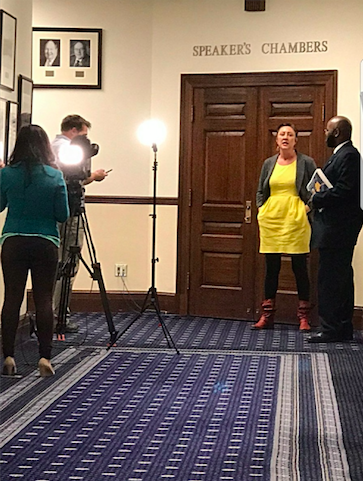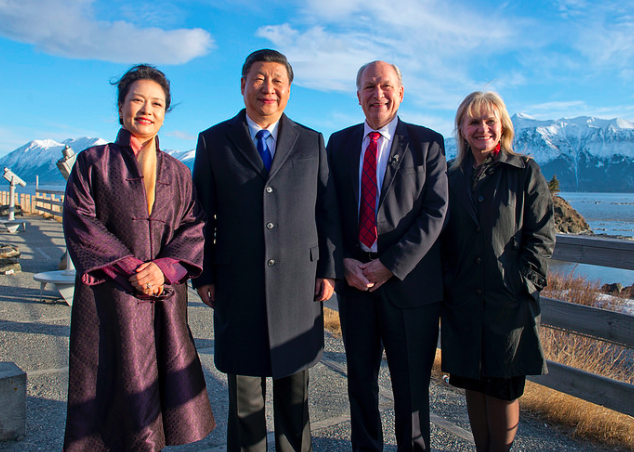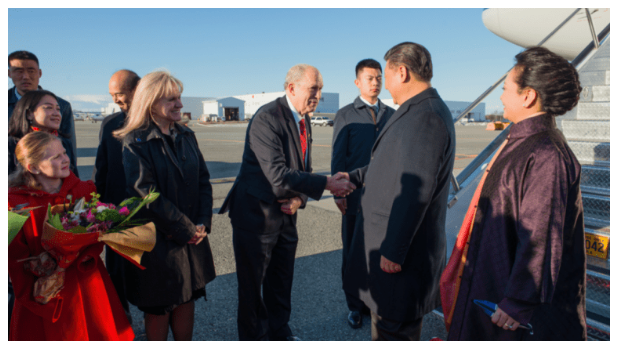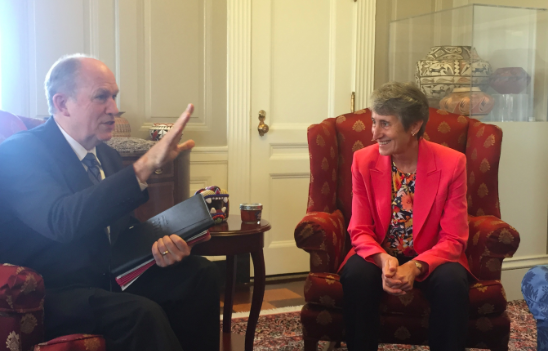THE DEMS HAVE THE LONG KNIVES OUT FOR SEN. WILSON
The scene of the alleged crime is a well-trafficked corner on the second floor of Alaska’s Capitol. It’s a busy spot and a place where people often gather.
Several months ago, an allegation was made about Sen. David Wilson, who had paused briefly in this public place, and is now defending his honor.
FACTS MATTER
The security tape of activity in the Capitol halls will show the facts of the incident described below. That tape is locked in a safe in the Capitol, guarded by head of Capitol Security, Steve Daigle.
Wilson has asked Legislative Council to let him see the tape, because it involves an allegation against him as a member. Democrats may try to block or delay that request for nefarious reasons related to the politics of destruction.
Rep. Gabrielle LeDoux, chair of the Rules Committee, has already gone on the warpath, even though she has not seen the tape. She is citing “rumors.”
Meanwhile, Wilson is evaluating a possible lawsuit against individuals who have accused him of sexual harassment. He is going to defend himself against libel and slander. He has talked to a lawyer about courses of action.
As Wilson told Must Read Alaska, he was hanging around the hall in front of the House Speaker’s Chambers, where the Democrat Majority was having a private meeting behind the large double doors. Wilson had been in the area in search of a 16-ounce paper cup when he started chatting with people.
A KTVA film crew was outside the room as well. Wilson lingered because he could hear loud music and wondered where it was coming from.
A House Democrat staff member told him to move along. He asked why and she told him it was because he was listening in.
No, Wilson said. If he was listening in, he would do this: He put his ear to the door for a few seconds to demonstrate what listening at the door would look like.
If he was listening in, he said, he would do this: He put his phone down by the bottom of the door, as if to show how someone could pick up some audio.
His phone was off.
The staffer blocked him. It all happened in a matter of seconds, and she then said he was “upskirting” her (filming up her skirt). She was wearing a dress with leggings.
A reporter nearby was wearing leggings with no skirt. Leggings are pants. Pants don’t need skirts.
According to Wilson, the moment the staffer accused him of “upskirting,” he put his hands up, backed away, and said, no, that was not his intent. He was taken aback at the suggestion.
Now, House Rules Chair Gabrielle LeDoux is making accusations, liberal bloggers are making accusations, and Wilson, who once playfully slapped a reporter who got on his nerves, again finds himself in the middle of a liberal witch hunt.
The staffer told the Juneau Empire this: “It’s inappropriate behavior. It seemed weird and inappropriate. … I don’t want to comment on this to the press. I never have.”
Except that she just did. She said it was weird and inappropriate.
Wilson told Must Read Alaska that he never saw where the phone was placed in relation to the staffer. It happened too fast.
CAN STAFFERS TELL SENATORS TO LEAVE PUBLIC SPACES?
Indeed, the halls of the Capitol are walked by members of the public every day. Kids take tours, tourists take pictures, and constituents familiarize themselves with the building by strolling and learning.
No one has asked the question about whether or not a legislative aide can order a lawmaker to leave the hallway. Or order any law-abiding citizen to leave.
Wilson says he was trying to make a point that if a camera crew could remain there, then anyone should be able to stand on that corner.
Perhaps it’s because the legislative staffer perceives the media as “on her team,” or perhaps this whole incident is being used by Democrats to hunt down a senator who had a run-in with a reporter, thus already has a record for behavior inappropriate to a senator.
Now, Senate President Pete Kelly has requested professional conduct training to ensure a healthy and harassment-free workplace.
In a letter to the Legislative Affairs Agency, Sen. Kelly wrote: “It has come to our attention that the Legislature’s workplace conflict and sexual harassment policies may not adequately address the desire we have to maintain the capitol as a safe and welcoming workplace for all.”
He then asks Legislative Affairs to organize training for legislators before the beginning of the next session in January, and a review of legislative procedures for handling complaints. The letter is signed also by Sen. Majority Leader Peter Micciche, Rules Chair Kevin Meyer, and Senate Finance Co-chairs Lyman Hoffman and Anna MacKinnon.
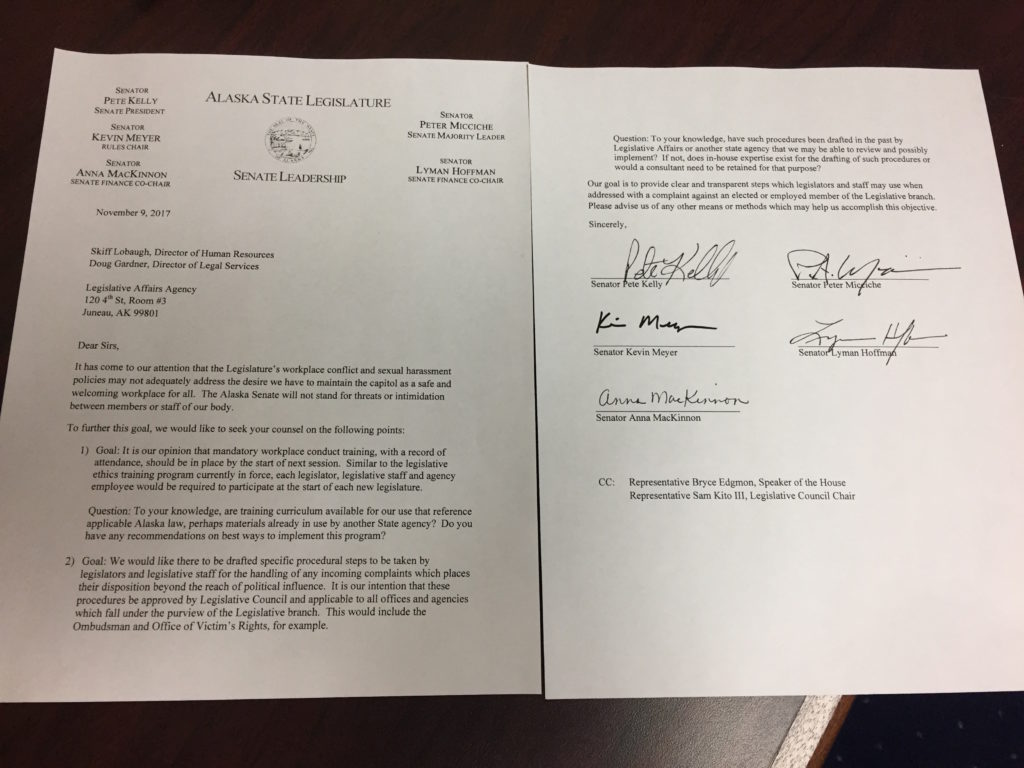
DREDGING UP DIRT AND IMPROVISED EXPLOSIVE DEVICES
Call it the post-Harvey Weinstein era, when sensitivities are heightened about relationships between workers and those who hold power.
The incident described above happened months ago and has been fodder for rumors and innuendo.
“They’ve sent a letter, but they haven’t bothered to do anything when one of their own members apparently acted inappropriately. It’s one thing to send letters; it’s another thing to do something,” Rep. Gabrielle LeDoux told the Empire.
“In deference to the victim — I’m not going to mention the victim’s name — but there have been rumors in this building about an incident which occurred … in June involving David Wilson, Sen. Wilson,” LeDoux continued.
If LeDoux starts tossing frivolous allegations at the Senate, the blowback could go in a lot of directions, including right back at her.
As with the Weinstein case, once accusations start, they can snowball, and she has members in her Democratic caucus who are vulnerable. Members who have affairs with lobbyists. Members who have affairs with their own staffers. This could easily backfire on LeDoux, who has been the subject of recent rumors herself.
The tape will tell it all. And if Wilson is right, and there was no offense, then he may have a case that can be taken past the court of public opinion and into the court of law.
